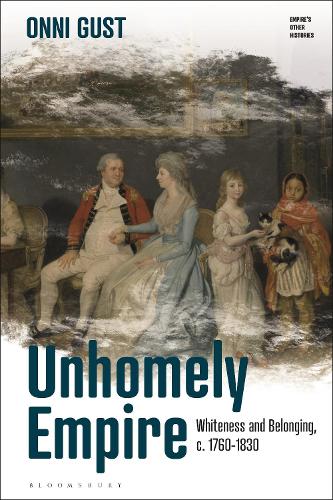
Unhomely Empire: Whiteness and Belonging, c.1760-1830
(Paperback)
Publishing Details
Unhomely Empire: Whiteness and Belonging, c.1760-1830
By (Author) Onni Gust
Bloomsbury Publishing PLC
Bloomsbury Academic
19th May 2022
United Kingdom
Classifications
Tertiary Education
Non Fiction
Colonialism and imperialism
Social and cultural history
General and world history
909.0971241
Physical Properties
Paperback
248
Width 156mm, Height 234mm
Description
This book examines the role of Scottish Enlightenment ideas of belonging in the construction and circulation of white supremacist thought that sought to justify British imperial rule. During the 18th century, European imperial expansion radically increased population mobility through the forging of new trade routes, war, disease, enslavement and displacement. In this book, Onni Gust argues that this mass movement intersected with philosophical debates over what it meant to belong to a nation, civilization, and even humanity itself. Unhomely Empire maps the consolidation of a Scottish Enlightenment discourse of home and exile through three inter-related case studies and debates; slavery and abolition in the Caribbean, Scottish Highland emigration to North America, and raising white girls in colonial India. Playing out over poetry, political pamphlets, travel writing, philosophy, letters and diaries, these debates offer a unique insight into the movement of ideas across a British imperial literary network. Using this rich cultural material, Gust argues that whiteness was central to 19th-century liberal imperialisms understanding of belonging, whilst emotional attachment and the perceived ability, or inability, to belong were key concepts in constructions of racial difference.
Reviews
An engaging and elevated analysis ... Prefaced by a well-balanced introduction and concluded with thoughtful contemporary implications of the research, Unhomely Empire is an approachable study for those familiar and those unfamiliar with the topic. * Social History *
Thought-provoking. * Journal of British Studies *
What Gust offers is a powerful account where whiteness intersects with other identities to create a distinctly British identity. * Roehampton RoundTable *
Onni Gusts Unhomely Empire is an exceptionally nuanced and delightfully troubling study of the ideas of belonging and estrangement at the heart of the British imperial experience threading through Scottish Highlands and India of the Company Raj. It brings together intimate questions of domicile, sexuality, and racial difference as key facets of imperial selfhood observed through overlapping lenses of history and biography in ways that have not been attempted before. * Sudipta Sen, Professor of History, University of California, Davis, USA *
Situated at the intersection of histories of Britain and the British Empire, and studies of the self and racial formation, Unhomely Empire: whiteness and belonging, c.1760- 1830 is a deep dive into the Scottish Enlightenment and its lived implications. By demonstrating how European imperial expansion, the trans-Atlantic slave trade, and racial thinking informed Scottish Enlightenment ideas of belonging, the book makes important contributions to cultural history and the history of imperial networks. * Professor Dana Robin, University of Illinois, Urbana-Champaign, USA *
Author Bio
Onni Gust is Assistant Professor of History at University of Nottingham, UK. A cultural historian of the British Empire in the long 18th century (c. 17301830), their work addresses questions of belonging and identity in the eighteenth-century British empire, with a particular interest in the development of ideas of race and gender. They have taught History and Gender Studies at University College London and the London School of Economics, both UK, as well as Amherst College, Smith College, and the University of Massachusetts, USA.
